This article needs additional citations for verification .(November 2015) |
This is a list of the top 50 singles of 1977 in New Zealand. [1]
This article needs additional citations for verification .(November 2015) |
This is a list of the top 50 singles of 1977 in New Zealand. [1]
Recorded Music NZ is a non-profit trade association of record producers, distributors and recording artists who sell recorded music in New Zealand. Membership of Recorded Music NZ is open to any owner of recorded music rights operating in New Zealand, inclusive of major labels, independent labels and self-released artists. Recorded Music NZ has over 2000 rights-holders.

"Blue Bayou" is a song written by Roy Orbison and Joe Melson. It was originally sung and recorded by Orbison, who had an international hit with his version in 1963. It later became Linda Ronstadt's signature song, with which she scored a Top 5 hit with her cover in 1977. The song has since been recorded by many others.

"Angel of the Morning" is a popular song written by Chip Taylor, originally recorded by Evie Sands but which first charted with a version by Merrilee Rush. The song has been covered by many artists including Chrissie Hynde, Dusty Springfield, P. P. Arnold, Connie Eaton, Mary Mason, Guys 'n' Dolls, Melba Montgomery, Olivia Newton-John, Bettye Swann and most recognizably by Juice Newton.
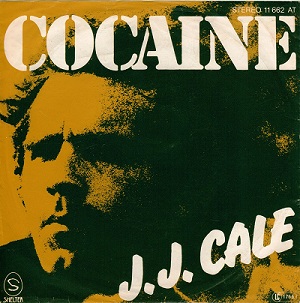
"Cocaine" is a song written and recorded in 1976 by singer-songwriter J. J. Cale. The song was popularized by Eric Clapton after his version was released on the 1977 album Slowhand. J. J. Cale's version of "Cocaine" was a number-one hit in New Zealand for a single week and became the seventh-best-selling single of 1977.

"Dreams" is a song written by American singer Stevie Nicks and recorded by British-American rock band Fleetwood Mac for their eleventh studio album, Rumours (1977). In the United States, "Dreams" was released as the second single from Rumours in March 1977, while in the United Kingdom, the song was released as the third single in June 1977. A stage performance of "Dreams" was used as the promotional music video.
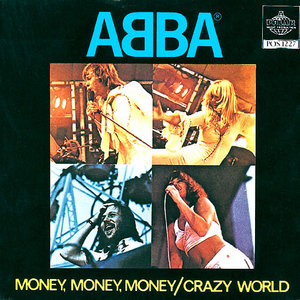
"Money, Money, Money" is a song recorded by Swedish pop group ABBA, written by Benny Andersson and Björn Ulvaeus with Anni-Frid Lyngstad singing lead vocals. It was released on 1 November 1976, as the second single from their fourth album, Arrival (1976). The B-side, "Crazy World", was recorded in 1974 during the sessions for the album ABBA. The song is sung from the viewpoint of a woman who, despite hard work, can barely keep her finances in surplus, and therefore desires a well-off man.
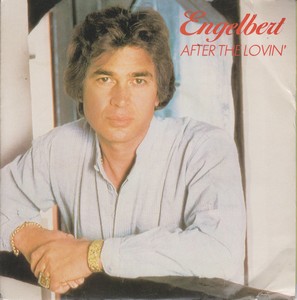
"After the Lovin'" is a single performed by Engelbert Humperdinck, produced by Joel Diamond and Charlie Calello, and composed by Ritchie Adams with lyrics by Alan Bernstein. The single was a U.S. top-ten hit in late 1976/early 1977, reaching number eight on the Billboard Hot 100 and number five on the Cash Box Top 100. It became a RIAA gold record. It is ranked as the 61st biggest U.S. hit of 1977. The song also reached number 40 on the country singles chart and spent two weeks atop the easy listening chart. It was Humperdinck's final Top 40 Billboard hit.

"Don't Give Up on Us" is a song by American-British singer David Soul. Riding high on the success of his role in the hit TV show Starsky and Hutch, Soul returned to singing, which had been one of his early career choices. His debut, the Tony Macaulay-written-and-produced "Don't Give Up on Us" was a worldwide smash, spending four weeks at No. 1 on the UK Singles Chart in January and February 1977, and a single week at No. 1 on the Billboard Hot 100 in April 1977. In addition, the song spent one week at No. 1 on the U.S. Adult Contemporary chart. It has sold 1.16 million copies in the UK.

"Undercover Angel" is a song by singer-songwriter Alan O'Day. Released as a single in 1977, it was certified gold, having reached No. 1 on the Billboard Hot 100 and No. 9 on the Australian Singles Chart.

"(Your Love Keeps Lifting Me) Higher and Higher" is an R&B song written by Gary Jackson, Raynard Miner, and Carl Smith. It was recorded by Jackie Wilson for his album Higher and Higher (1967), produced by Carl Davis, and became a Top 10 pop and number one R&B hit.

"Rich Girl" is a song by Daryl Hall & John Oates. It debuted on the Billboard Top 40 on February 5, 1977, at number 38 and on March 26, 1977, it became their first of six number-one singles on the Billboard Hot 100. The single originally appeared on the 1976 album Bigger Than Both of Us. At the end of 1977, Billboard ranked it as the 23rd biggest hit of the year.

"Moody Blue" is a song made famous by Elvis Presley. The song was written by Mark James who recorded the original version of the song, which reached #15 in South Africa during the summer of 1976. James also penned Elvis' "Suspicious Minds".

"Best of My Love" is a song by American band the Emotions from their fourth studio album Rejoice (1977). It was composed by Maurice White and Al McKay of Earth, Wind & Fire, and produced by White and Clarence McDonald.

"More Than a Woman" is a song by musical group the Bee Gees, written by Barry, Robin, and Maurice Gibb for the soundtrack to the film Saturday Night Fever. It became a regular feature of the group's live sets from 1977 until Maurice Gibb's death in 2003 and was often coupled with "Night Fever".

"Only Love Can Break a Heart" is a popular song from 1962, performed by the American singer-songwriter Gene Pitney. The song was written by Hal David (words) and Burt Bacharach (music) and appears on Pitney's second album Only Love Can Break a Heart.
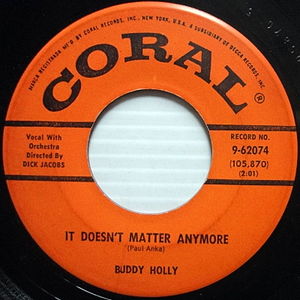
"It Doesn't Matter Anymore" is a pop ballad written by Paul Anka and recorded by Buddy Holly in 1958. The song was issued in January 1959, less than a month before Holly's death. "It Doesn't Matter Anymore" reached number 13 as a posthumous hit on the Billboard Hot 100 chart in early 1959, shortly after Holly was killed in a plane crash on February 3, 1959. The single was a two-sided hit, backed with "Raining in My Heart". "It Doesn't Matter Anymore" was Holly's last US Top 20 hit and featured the orchestral backing of Dick Jacobs. It was also successful in the United Kingdom, where it became the country's first posthumous number 1 hit.
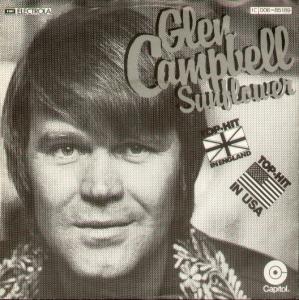
"Sunflower" is a song written by Neil Diamond and recorded by American country music singer Glen Campbell. It was released in June 1977 as the second single from Campbell's 1977 album, Southern Nights. "Sunflower" was the last of eight number ones on the Easy Listening chart for Campbell. The single spent one week at number one and peaked at number 39 on the Billboard Hot 100. "Sunflower" peaked at number four on the US country chart.
Mike Collings is a sport shooter from New Zealand.
The Official New Zealand Music Chart is the weekly New Zealand top 40 singles and albums charts, issued weekly by Recorded Music NZ. The Music Chart also includes the top-20 New Zealand artist singles and albums and top 10 compilation albums. All charts are compiled from data of both physical and digital sales from music retailers in New Zealand.
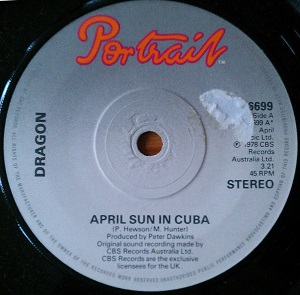
"April Sun in Cuba" is a song recorded by New Zealand group Dragon, released in October 1977. It is the first single to be released from Dragon's fourth studio album Running Free. "April Sun in Cuba" first charted on 7 November 1977, peaking at number 2 on the Kent Music Report Singles Chart and staying on the chart for 22 weeks. It also reached number 9 on the New Zealand singles chart. The b-side of the single, a non-album track called "Telephone", was credited to "Dr. Agony".